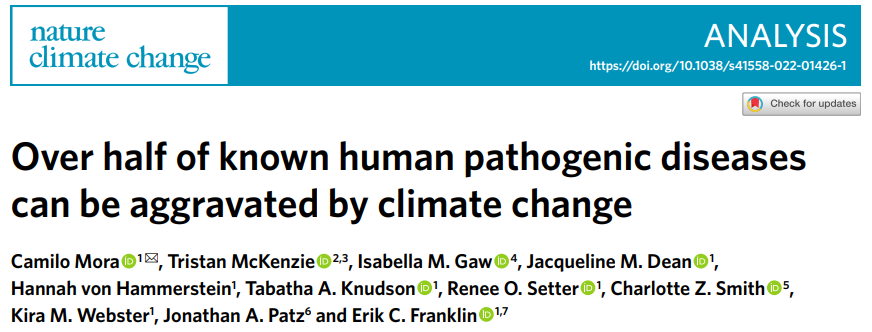The article explores the link between climate change and disease transmission. It identifies 1,006 ways that climate hazards can affect disease spread, highlighting the complexity and urgency of these issues. Over half of known human pathogenic diseases can be aggravated by climate change.
It urges immediate actions to curb greenhouse gas emissions and combat environmental degradation to protect human health. Greenhouse gas emissions intensify climate hazards like altered precipitation, severe heatwaves, storms, rising sea levels, and ecosystem changes, potentially spreading infectious diseases and disease vectors.
By disturbing ecosystems and altering disease vectors and transmission, climate change increases vulnerability to outbreaks like COVID-19. The pandemic emphasizes the link between health, environment, and pathogen emergence, stressing the need for climate change mitigation to reduce health risks.
To prepare for looming health crises driven by climate change and the spread of pathogenic diseases, society can take several actions:
- Implement policies to reduce greenhouse gas emissions and mitigate climate change impacts to prevent the worsening of disease transmission pathways.
- Enhance surveillance and monitoring systems to detect and respond to changes in disease patterns and emerging infectious threats linked to climate change.
- Strengthen public health infrastructure and healthcare systems to improve readiness for disease outbreaks and ensure effective response mechanisms.
- Promote research and collaboration among scientists, policymakers, and communities. Thus, to better understand the complex interactions between climate change and human health, develop strategies for adaptation and resilience.
Overview
Search strategy and selection criteria
Describes the process of identifying disease cases impacted by climate hazards through three literature searches. These combined ‘ diseases’ with ten climate hazards related to greenhouse gas emissions and disease names from databases. A table of diseases and hazards was compiled, including initially overlooked cases.
They selected evidence-based papers, dismissing those without examples. Eleven reviewers curated titles and summaries and added pertinent references to a database, accumulating 3,200 references. Also, they aimed to identify solid examples connecting climatic hazards with diseases to bolster our study’s conclusions.
Results and discussion
Presents results from a comprehensive search for diseases affected by climatic hazards. Over 77,000 titles were examined, focusing on clear evidence of diseases impacted by specific climatic hazards. The strategy involved systematic mapping of literature using various keywords and databases.
This section analyses the search methodology, results, and implications to understand climate hazards’ impact on health. It emphasizes the importance of research in establishing links between climate change and disease spread, aiding in preparing for and mitigating health issues.
Concluding remarks
Highlights the significant threat of climate change to human health by worsening pathogenic diseases. It indicates the wide range of climatic hazards that can exacerbate infectious diseases. The study emphasizes the need for urgent actions to reduce greenhouse gas emissions and tackle the rising public health risks.
The study aims to understand human vulnerability to climate-related health impacts by examining climatic hazards and diseases. The complex interactions emphasize the need for integrated approaches to address the health consequences of environmental changes. It highlights the need for proactive steps to mitigate climate change and protect public health from environmental hazards and diseases. The study necessitates efforts to tackle climate change’s root causes and strategies to protect health amidst environmental challenges.



